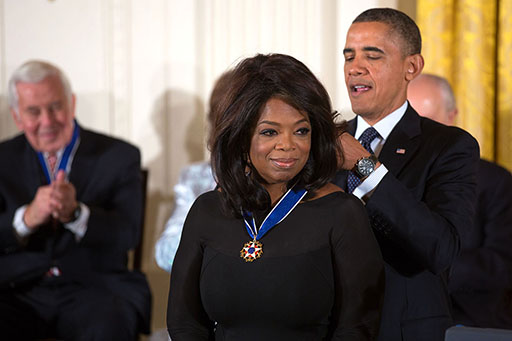4 Brands that work – case study
Oprah Winfrey is a talk show host, actor, philanthropist and owner of a multi-media production company. The Cult Branding Company (n.d.) offers a summary of her brand, which includes the following details:
Some TV personalities seem distant and removed from the general public, but Oprah has never shied away from sharing intimate, personal details about her life with her audience. […] By sharing these intimate personal details, Oprah shows her viewers that when the lights and cameras are all put away, she faces many of the same problems as they do. She is indeed an ordinary person with ordinary problems to overcome. It’s her seeming vulnerability and fragility that make her that much more inclusive of a brand.
While sharing that level of detail would be uncomfortable for most of us, and usually unnecessary in a career context, this case study very clearly illustrates the value of an authentic brand.
What is authenticity?
The concept of an authentic or true self is a contentious one. The authors outlined in this section believe it to be a relevant and important concept, while others describe it as a non-scientific ‘fiction’ (Strohminger, 2017, p.7). Strohminger gives two reasons for her conclusion:
- ‘the true self depends on the values of the observer’ and is therefore subjective ‘and strongly tied to what each individual person herself most prizes’, and
- ‘claims made on its behalf may completely contradict all available data’ so ‘the true self is posited rather than observed’.
While the existence of an authentic self might not be scientifically proven, the word ‘authentic’ is regularly used when discussing personal branding as it presents a useful and relevant concept.
Leading positive psychology academic, Professor Stephen Joseph (2016) gives a list of what he perceives are the common characteristics of authentic and inauthentic people, which includes the following:
| Authentic | Inauthentic |
|---|---|
| Have realistic perceptions of reality. | Are self-deceptive and unrealistic in their perceptions of reality. |
| Are accepting of themselves and of other people. | Look to others for approval and to feel valued. |
| Are thoughtful. | Are judgemental of other people. |
| Are able to express their emotions freely and clearly. | Are unable to express their emotions freely and clearly. |
| Are open to learning from their mistakes. | Are not open to learning from their mistakes. |
| Understand their motivations. | Do not understand their motivations. |
Joseph explains: ‘If behind what a person says and does is a defensive and self-deceptive approach to life, then no matter how passionate and committed they are to a cause, ultimately they are not being true to themselves.’
Watch this short video to see how respected author and motivational speaker Simon Sinek explains authenticity:
Activity 4 Can I be authentic at work?
Based on what Simon Sinek said about ensuring that you believe in the things you say and do, ask yourself the following questions and write your thoughts in the box below:
- Are there times when I must do things that go against my own values?
For example, you really value family but you are required to work long hours and, as a result, always feel like you’re neglecting them.
- Do I ever have to work in a way that doesn’t reflect my preferred style?
For example, your job requires you to focus on the bigger picture when you would much prefer to immerse yourself in the operational details.
Discussion
If you feel that your work doesn’t align with your values or preferred working style, and that you’re having to present yourself in a way that feels uncomfortable, or inauthentic, that can have an impact on your job satisfaction.
The Kaleidoscope Career Model (Mainiero & Sullivan, 2006), based on a five-year study examining people’s career patterns, identifies three parameters that lead people to ‘take stock of their career decisions and make changes and transitions to meet their needs’:
- an individual’s need for challenge
- a need for balance
- a need to ask ‘How can I be authentic, true to myself and make genuine decisions for myself in my life?’
We all have to compromise sometimes in the workplace, but if you feel you are compromising too much, that can impact on your job satisfaction, your attitude towards your job and the way others perceive your personal brand.
You’ll explore your values, strengths, attributes, etc. later in the course, but this activity is designed to start you thinking about whether your current role allows you to be yourself in the workplace.
While discussions about ‘authentic self’ will undoubtedly continue, for the purposes of this course it might help to think of authenticity as meaning ‘genuine, real and true’. The more honest you can be in presenting your personal brand, the more effective it will be in representing who you are and what you are looking for.

